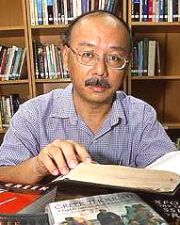
Excerpt from Kam Weng's summary of dialogue with Dr. Louay Fatoohi at the International Institute of Advanced Islamic Studies on August 13 2009.
"First I should give credit where credit is due. Dr. Fatoohi’s 800 page book, The Mystery of the Historical Jesus: The Messiah in the Qur’an, the Bible and Historical Sources (Kuala Lumpur: Islamic Book Trust, 2009) represents a major step forward in Muslim engagement with Christology. It is more sophisticated than the other big book “What Did Jesus Really Say? (600pp) written by Misha’al Ibn Abdullah Al-Kadhi in 1995 in that it tries to engage with critical scholarship.
Nevertheless, I can only conclude that Fatoohi’s book is seriously flawed. It is inadequate from the point of view of methodology when the Biblical sources are treated in abstraction and in isolation from their historical and cultural context. Since Fatoohi detached the Biblical texts from the historical trajectory of the life and faith of the early Christian community, he naturally took liberty with these texts. Without a comprehensiveness and consistent historical methodology and hermeneutics, Fatoohi ends up cherry-picking from critics who share his skepticism about the Biblical texts, primarily Geza Vermes and E. P. Sanders.
One symptom of Dr. Fatoohi’s flawed reading is his treatment of the so-called prophecies of Muhammad in the Bible. This is really a silly feature of simplistic Islamic apologetics that could easily be disposed off in 10 minutes. The way in which so many Muslims go about proof-texting the claim that Muhammad was prophecied in the Bible really makes them look naïve, if not desperate. I would recommend Muslims seriously abandon this fruitless venture.
However, I refrained from giving this Muslim apologetic a proper refutation since I was only given 30 minutes for my presentation. I decided to focus on more fundamental issues like typology and prophecies in the gospels to emphasize that the gospel teachings flow naturally from the Old Testament.
I cited R. T. France’s excellent Ph. D dissertation on Jesus and the Old Testament (Tyndale 1971). France’s gave a succinct explanation of typology:
“There is a consistency in God’s dealing with men. Thus his acts in the Old Testament will present a pattern which can be seen to be repeated in the New Testament events; these may therefore be interpreted by reference to the pattern displayed in the Old Testament. New Testament typology is thus essentially the tracing of the constant principles of God’s working in history, revealing ‘a recurring rhythm in past history which is taken up more fully and perfectly in the Gospel events’.
When the Gospel writers use typology, then, they are often not claiming to be interpreting the meaning of the Old Testament passages cited but rather showing how contemporary events are falling into a pattern so reminiscent of what God did in the past that they can explain the present only in terms of God’s acting again.”
Christian scholars are only happy to demonstrate that the faith of the early Christians was rooted in the Old Testament and map out a plausible historical trajectory between prophecy and fulfillment in the Old and New Testament, supported with details drawn from their historical context and social milieu. For a starter I refer to the classic work done by C. H. Dodd on The Apostolic Preaching and its Developments (1936). See also Paul Barnett two works: Jesus and The Rise of Early Christianity (1999); The Birth of Christianity: The first twenty years (2005).
In contrast, it is neither evident nor possible to discern a plausible historical trajectory between the Biblical texts and the later Quranic references to Jesus. At best, the Quran reflects more of the milieu of later apocryphal stories and post-biblical Judaism several centuries later, cf. Abraham Geiger, Judaism and Islam. In this regard, I must conclude that the Quranic Jesus can only be asserted dogmatically. It is a theological claim rather than a historical conclusion."
Report by Rev. Fr. Michael Chua, Ecclesiastical Assistant, Archdiocesan Ministry of Ecumenical and Interreligious Affairs, Archdiocese of Kuala Lumpur
Here is the report posted on the website of the International Institute of Advanced Islamic Studies















No comments:
Post a Comment